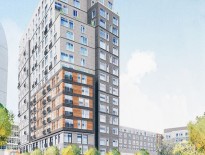Amazon is likely to choose either Northern Virginia or Atlanta for its new headquarters, according to a new survey of economic and housing experts. Austin and Denver were also cited as strong contenders.
After receiving 238 bids, Amazon announced in January that it narrowed its search for a second headquarters (HQ2) to 20 cities, including Boston. HQ2 is widely expected to have a profound impact on housing and the local economy in and around the city Amazon ultimately chooses.
Since Amazon announced last September that it would build a second headquarters somewhere in North America, it’s become a popular game to guess which city they will choose based on its criteria. Zillow asked over 100 housing and economics experts to offer a prediction through their unique lens. Amazon is expected to announce its choice later this year.
Among the 20 cities on Amazon’s list, Atlanta has the fourth lowest home values and rents, making it an attractive option for Amazon, which is expected to hire as many as 50,000 people. Northern Virginia, part of the Washington D.C. metro, is among the more expensive housing markets on the top 20 list, but would put Amazon at the doorstep of the nation’s top policymakers.
As Amazon has grown from a startup bookstore to one of the country’s most prominent retailers, Seattle home values, where Amazon is based, have almost doubled and rents have increased by half. However, Seattle’s growing pains can’t all be blamed on Amazon – the jobs boom in and around Amazon’s current headquarters in Seattle’s South Lake Union neighborhood explains less than one-fifth of the region’s rising rent. The company’s growth has created a business environment that has attracted many other employers to Seattle.
“As the experience of Seattle suggests, Amazon will not only directly bring thousands of high-paying jobs to the chosen city, but also has the potential to transform the regional economy,” Zillow Senior Economist Aaron Terrazas said in a statement. “The local jobs boom that Amazon’s HQ2 promises will spur demand for the full spectrum of housing types – ranging from urban apartments to suburban single-family homes. Atlanta has the benefit of being one of the most affordable markets in the country, and is undergoing an urban renaissance with new public infrastructure providing attractive opportunities for employers seeking to lure young urbanites. Northern Virginia has its benefits as well, as it’s close to a highly educated workforce and a well-developed public transit infrastructure in the D.C. area.”
In addition to affordability, experts cited land availability, talent and business friendly tax codes as a few reasons why they believe Amazon will choose Atlanta as its second headquarters. A growing tech workforce and easy access to Washington D.C. policymakers were noted by respondents as reasons why Northern Virginia may be Amazon’s chosen second home.
Many cities that bid to become Amazon’s second headquarters offered tax breaks and other benefits to the company, which will likely be considered alongside reasons cited by experts. For its bid, the city of Worcester touted half a billion dollars in tax breaks, for example.
The quarterly survey, sponsored by Zillow and conducted by Pulsenomics LLC, asked more than 100 housing economists and professors about their overall expectations for the U.S. housing market, as well as what city they think is most likely and least likely to be chosen as Amazon’s second headquarters.
Among the 85 experts who responded, 12 said Amazon is most likely to choose Atlanta, 12 selected Northern Virginia, 11 selected Austin, nine selected Raleigh, North Carolina and six selected Denver.
Los Angeles, Newark, New York and Miami were the cities respondents said were the least likely to be chosen by Amazon. Reasons include high housing costs, traffic and an unfavorable tax environment. Los Angeles is one of the most expensive housing markets in the country, with a median home value of $636,500 and a median rent payment of $2,738, almost twice as expensive as the national median. Residents in the Los Angeles metro can expect to put 41 percent of their monthly income toward a mortgage payment and almost half toward rent.




 |
| 

